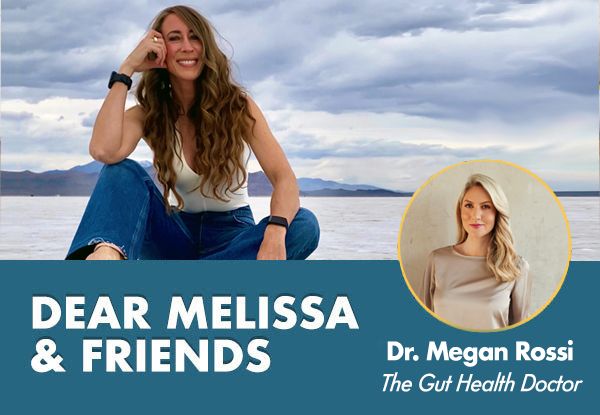This issue of Dear Melissa & Friends is all about natural probiotics found in foods and drinks, and features Dr. Megan Rossi (PhD, RD, APD), The Gut Health Doctor.
Probiotics and gut health are trending right now. The use of probiotics have been shown to have benefits that go well beyond your digestive system, including medical conditions like depression, anxiety, and autoimmune conditions like PCOS. As a result, it seems like there are probiotics in everything these days—chocolate bars, cereals, teas, tortilla chips, even brownie baking mixes. Are these foods and beverages actually helpful for our gut health?
Today we’re joined by world-renowned gut health expert Dr. Megan Rossi (The Gut Health Doctor) to discuss the good, the bad, and the downright silly when it comes to probiotics and gut health.
A primer on probiotics and gut health
Your “gut” (a series of digestive organs, including the small and large intestine) is home to your microbiome—a diverse community of organisms like bacteria, fungi such as yeasts, and viruses that work together to keep your body healthy. The “good” bacteria in your microbiome have a positive impact on health. “Bad” bacteria can exist at low levels without causing much harm. However, an imbalance between the good and bad bacteria can lead to negative health consequences, and even promote disease. One way to help your body maintain this healthy balance is by regularly consuming “good” bacteria in the form of probiotics.
Probiotics are beneficial, living bacteria naturally found in the body and in certain foods, such as yogurt, kombucha, and sauerkraut. Probiotics help maintain that healthy bacterial balance in your body, and offer a number of benefits, like helping you digest food, managing inflammation, synthesizing vitamins, and supporting good health. They also support the cells that line your gut, keeping it intact and healthy. A healthy microbiome can also help to prevent and treat digestive diseases, yeast infections, oral disease, food allergies, and skin conditions like eczema.
Melissa’s Q&A with Dr. Rossi
MU: Probiotics are trending right now! What is the mainstream media getting right about these beneficial compounds, and what misconceptions do you hear the most from the general public?
Dr. Rossi: There is a growing and frankly concerning trend towards generic, over-simplified, one-size fits-all gut health recommendations. I’m sure you’ve all heard it before: ‘Eat more probiotics’, ‘Eat more fermented foods’ . . . and on and on. These messages, although I’m sure they’re mostly given with only good intentions, can actually do more harm than good.
I’m passionate about probiotics because the science, research and evidence behind the effective use of them hasn’t reached the public. It’s something that we’re working on at The Gut Health Doctor: both in terms of education but also providing the right products to support individual’s needs. Follow @theguthealthdoctor to be the first to know of any developments!
I’m seeing all kinds of foods infused with probiotics these days, from gummies to cereal to chocolate bars. Can you really get a healthy dose of beneficial bacteria from these kinds of foods?
Despite some products showcasing the inclusion of ‘PRObiotics’ (live cultures), there are sadly a few reasons why this is misleading:
- Probiotic strains are very specific, as each strain does different things. Having a random probiotic in a cereal simply hasn’t been shown to help when looking at gut health benefits, even if it does ‘survive’ the acidic stomach.
- The money spent on putting these ‘probiotics’ into cereal products for instance will usually mean compromising on quality for the rest of the ingredients, so they can still get the lower price point.
- To help the bacteria survive in an ‘artificial’ environment like cereal they often need to add in other things such as saturated fat, added sugars and food additive emulsifiers…. which somewhat contradicts the gut health goal.
That’s not to say these, or any foods, are ‘bad’ (no labels here!)—but please don’t eat them thinking they’re doing wonders for your gut health.
How does someone know if they’d benefit from a probiotic? Is it generally a good practice for everyone to supplement?
Generally speaking, if you’re in good health, the evidence for taking a probiotic at this stage is actually pretty weak. If there is something in particular that you’re aiming to manage, for for example a gut symptom or a health condition, then, in some cases, it may be advisable. It all comes down to your specific condition and whether there is any evidence for a particular type of probiotic.
It’s also worth recognizing that different probiotics do different things and therefore have different indications. It’s like medication—you wouldn’t take a painkiller to improve your cholesterol. There is no point taking one just for the sake of ‘good gut health’—there is no science to back that up. And if you think about it, the amount of diversity and quantity that already exists in your gut, taking one to ‘top up’ the number in your gut is equivalent to adding a drop in the ocean.
When deciding whether a probiotic is right for you, there are several things worth considering. To help simplify things, I have summarized the six inquiries I recommend you and your healthcare provider follow:
- IS THERE EVIDENCE FOR YOUR SYMPTOMS?
- WHICH MICROBES HAVE SHOWN BENEFIT?
- WHAT IS THE EFFECTIVE DOSE?
- HOW LONG DOES IT TAKE TO SEE A BENEFIT?
- IS THERE A RELIABLE PROBIOTIC ON THE MARKET?
- HOW SHOULD IT BE CONSUMED?
Probiotics are found naturally in cultured and fermented foods like kombucha, sauerkraut, kimchi, tempeh, and yogurt. Are these actually good sources of beneficial bacteria?
Traditional fermented foods are associated with a whole host of potential benefits, including increasing vitamin concentrations (such as folate and vitamin B12), reducing anti-nutrients, lowering blood pressure, supporting our immunity and having a calming effect.
Although I am a big fan of fermented foods and anecdotally, I’ve seen first-hand the physical and mental benefits of them, with my science hat on, I must declare the clinical evidence for most types is currently limited. (The exception is fermented dairy like live yogurt if dairy is well tolerated, where there is decent evidence for the health benefits across heart health, bone health and digestion.)
The clinical evidence aside, our ancestors have been having fermented foods for thousands of years and associating them with benefit, not to mention they are so full of flavor. So yes high-quality clinical studies need to be done, but in the meantime I do recommend people include fermented foods into their daily diet.















